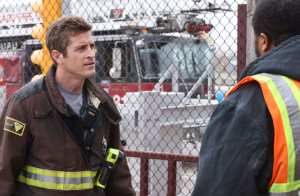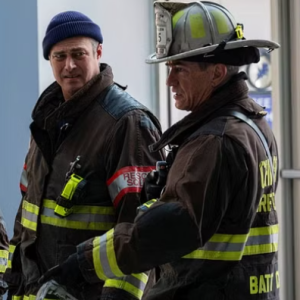For fans of NBC’s long-running powerhouse Chicago Fire, the end of Season 13 was a bittersweet punch to the heart. On one hand, it gave a glimmer of hope that Violet Mikami and Sam Carver’s fiery chemistry might finally reach its long-awaited breakthrough, but on the other, it seemed to slam the door shut on their future together with the devastating “news” that Jake Lockett was leaving the series. Carver, the once-troubled firefighter who had carved out a place in the hearts of fans through his journey of growth and redemption, appeared destined for an exit that would cut his love story short before it truly began. The narrative was crafted so well that viewers believed the heartbreak was inevitable: Carver was bound for Denver, Violet was left reeling, and Firehouse 51 was bracing for yet another painful farewell. But in true Chicago Fire fashion, the story wasn’t as straightforward as it seemed. A bombshell reveal has emerged that changes everything: Carver’s exit was not the end, but a carefully orchestrated misdirect. What fans thought was a permanent goodbye was, in reality, a narrative sleight of hand designed to magnify the emotion of the Season 13 finale, and the shocking twist ensures that Carver’s story—and his romance with Violet—is far from over.
The heartbreak began with the reported exit. Since his introduction in Season 11, Carver’s arc was one of the most compelling on the show. He entered Firehouse 51 as a moody, reckless figure, a man shadowed by his past and haunted by self-doubt, but over time he transformed into a trusted brother-in-arms and a key part of the team. His rocky but passionate relationship with Violet became a highlight, striking the perfect balance of firehouse drama and emotional vulnerability. That’s why the news of his departure landed like a gut punch. In the Season 13 finale, Carver was offered a transfer to the Denver Fire Department, and the episode masterfully built the tension of his looming departure. In a moment of pure, unfiltered passion, he kissed Violet and confessed his love, leaving fans both thrilled and devastated. Reports of Jake Lockett’s exit quickly circulated, tying his departure to broader budget cuts in the “One Chicago” franchise. It seemed like the perfect storm of narrative and reality, and fans braced themselves for the worst. Carver was leaving, Violet would be left behind, and their love story would be another casualty of circumstance. The heartbreak was made even sharper because it felt so final, so definitive, as if there was no room left for hope.
But now, the narrative has been flipped on its head. In a stunning reveal, showrunner Andrea Newman confirmed that Carver’s exit was not what it seemed. While Jake Lockett will not remain a series regular in Season 14, he is not gone for good. Newman teased that Carver will still appear throughout the season, saying, “We may not have Carver full-time next season, but we may have him for a bunch of it too,” and adding that there is “a lot left to figure out” between Carver and Violet. In one breath, Newman erased the finality of Carver’s departure and replaced it with possibility. What once looked like a heartbreaking goodbye is now a thrilling continuation, albeit in a new form. Carver has been shifted from a full-time character to a recurring role, a compromise that allows the show to balance budget demands while still honoring the investment fans have made in his character. What was once framed as a shocking exit now feels more like a carefully planted misdirection, a narrative trick designed to make the finale kiss feel unbearably poignant and the reveal of his return exponentially sweeter. It was less a permanent exit than a calculated lie, a cliffhanger that toyed with fan emotions and amplified the drama to maximum effect.
This revelation doesn’t just undo the heartbreak—it redefines the possibilities for Season 14. Carver’s reduced presence still ensures that his storyline with Violet can flourish rather than evaporate. Their “will-they/won’t-they” tension is now granted the breathing room to evolve organically instead of being cut short by distance or forced tragedy. The door is wide open for the romance to deepen, for Violet to explore what Carver truly means to her, and for Carver to continue his growth as both a man and a firefighter. His intermittent presence at Firehouse 51 also creates fresh professional dynamics; he’s no longer a constant, but an unpredictable force who can re-enter the firehouse at pivotal moments, keeping the team—and the audience—on edge. This unpredictability mirrors the uncertainty faced by real firefighters, whose careers are often subject to sudden changes, transfers, and budget pressures. And in the larger narrative, the so-called “lie” of Carver’s departure is more than just a twist for fans—it’s a reminder to the characters themselves that nothing is certain, that stability is always fragile, and that sometimes second chances appear when least expected.
In the end, the supposed exit of Sam Carver is a masterclass in storytelling by Chicago Fire. By allowing fans to believe they had lost him, the writers injected a potent dose of heartbreak into the Season 13 finale, turning Carver’s kiss with Violet into an unforgettable moment drenched in the weight of farewell. But by pulling back the curtain and revealing that his story is not over, they transformed that pain into relief and anticipation, proving that even in its 14th season, the show is still capable of pulling off twists that leave its audience gasping. The lie of Carver’s exit was never about deceiving fans for cruelty’s sake—it was about amplifying the drama, intensifying the stakes, and reminding viewers why they keep coming back to Firehouse 51 after all these years. Now, instead of mourning the end of Carver’s journey, fans can look forward to the continuation of one of the most promising love stories in the show’s history. Season 14 won’t just be about survival; it will be about hope, resilience, and the burning truth that sometimes, even in the face of heartbreak, the story is far from over.





